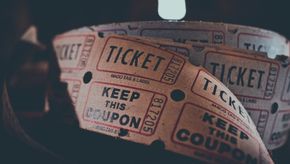Ein kleines Picknick mit RJD2
students Redaktion - Kaserne, Basel am frühen Abend. Die Sonne scheint zu stilvoller Jazzmusik. Ein entspannter Ramble John Krohn sitzt bereits draußen vor seinem Laptop. Ich stelle mich kurz vor , zehn Minuten später setzt er sich mit einem Sandwich zu mir auf die Parkbank. Students.ch: Is th...
Kaserne, Basel am frühen Abend. Die Sonne scheint zu stilvoller Jazzmusik. Ein entspannter Ramble John Krohn sitzt bereits draußen vor seinem Laptop. Ich stelle mich kurz vor , zehn Minuten später setzt er sich mit einem Sandwich zu mir auf die Parkbank.
Students.ch: Is this the first time for you in Switzerland?
RJD2: Now, it is not my first time in switzerland, but I think it is my first time in Basel. I plaid Bern and Zürich and I did the Montreux Jazzfestival once. I went through switzerland a couple of times and it is very nice. Everything is very clean, I like it.
The title of your new album is 'The Colossus'. Is it as loaded as the name might suggest? Sounds kind of heavy...
Yeah, I guess I kind of see it as ’heavy’ in some ways. But I think in a way, it's like a natural thing I just shoot for. When I look back on my previous records, I realize, that they do kind of apply to the term heavy. Most of the things that I do. Not heavy in the sense of depressing, you know. When I think of some really great funk records, people have described it as heavy funk. It's the phrase that people use. The spirit of rock music, funk music, soul and hip hop music and everything that really contributes to what I do is intense. I think that is one of the primary, most descriptive terms to describe what I do. So I do think that heavy would be an analogous or proper.
Here it becomes obvious how difficult it is to put you in a genre.
Yea, I think songs are much easier to classify and put in a genre. When you try to put an album into a genre it gets harder and when you try it with a whole catalogue I think it becomes very difficult.
You've released the album on your own, new founded label this time. Why did you take this DIY approach after working successfully with various record companies? Why take business into your own hands in such difficult economical circumstances?
Well, you are right. It is a hard time to be starting a label. The plus, and the thing that I think makes it easier for people like me, is that I am, relatively speaking, freelancing things out and then doing as much as I can by myself. I am not approaching it as a business. I am not trying to built a staff or anything like that. So in that sense I would like to think that this would make it easier than for someone who wants to run it as a proper business. For me its sole function is to release my own music. It is very highly specialized. So while it is a bad time to be starting a record label, just to put out records, hopefully, it is not necessarily a bad time t be doing that kind of highly specialized form of a record. And why I wanted to do it is, on tour I can make a living as a touring musician and at the moment I can almost make a living as a publisher and freelancer, in terms of recording and stuff. So this kind of freed up the release of record, since I don't need an advance from a label like a young band might need one. And on the other side, I got to a point where not owning any master recordings, just didn't seem right for me. Owning masters became a big deal for me. My option where either, to try to put this record out through a label like XL or whatever and get a big advance of some sort and not own the record or to sacrifice the advance and maintain the ownership of the record.
So that way, you can sustain as a musician, keep your own music and receive the money not in advance, but over time.
Hopefully! It might not be worth anything in ten years, the way that the music industry is going right now. Who knows?
Well, what do you think? The industry keeps evolving, where are we heading?
It's hard to say. I am not gonna try to 'nostredamus' that one. I am just along for the ride. But I think vinyl is not gonna go anywhere. The increase in vinyl makes a lot of sense to me: people want to have a physical representation of something that has an emotional content, that they can connect with. Looking at market trends, vinyl never stopped selling. It has never been a huge percentage, even at the time when cd were that grossly hugely profitable thing, vinyl still sold at least at a small percentage. Now that cd-sales are plummeting vinyl-sales are actually increasing. So I think it is not going to go away. But I wouldn't be surprised if we'll see just a radical restructuring, where outside of vinyl, by enlarge it is accepted that you make music for free and that it's an advertising for your show.
You said your album is highly specialized. Could you imagine to release other artists?
Possibly. I mean those two things go hand in hand. If there is that possibility that running a record label could somehow be a sustainable and profitable business on its own then I would be more than willing to look into that kind of thing and would be totally interested in it. Right now it is going the opposite. You know. And I expect it to continue. If something happens and there is a turn of events in that economy and in that industry in the future, than it's possible.
You have come a long way, yet your style still seems fresh. 10 years ago I saw you playing in Frankfurt, since then you have continued to tour and produce productively. What are you aiming at in the years to come? Do you have any aims at all or are you just along for the ride as you mentioned before?
My only aims or I should better say, my nature is to keep myself interested. The way to do that is to keep looking for different kinds of music and how to appreciate music that I didn't appreciate before, that one didn't appreciate before. Everything you listen to, influences what you do. So for me that process of going out and exploring and discovering new forms of music and than consolidating, retracting and digesting things that you've learned and than incorporating it, naturally it gets incorporated in what you do. thats kinda the only way I know of to go about both listening and making music. So I might have short term plans that I might like to do in the immediate future, but I have never been someone who plans on something like a long term master-plan, so to speak.
You are doing a lot of licensing. MadMen, CSI and all sorts of add-agencies bought the rights to use your music for their purposes. As a musician, as an artist, do you choose your clients carefully? Was there a case where you denied a licensing request for some reason?
I do think about it to a certain extend. But at the same time, I think it is silly when artist are like: 'I don't want to license music to a company because I have that inherent value. I would allow that evil corporation to sell more units of what ever product they make.' I personally think it is foolhardy to think that music any music is that powerful. And even if it is, it got to be a drop in the bucket, because they are going to license something else. You know, I am not saying you should do what ever you want and that there is no moral lines. I am less concerned with supporting a corporation and more concerned with how condoning a particular corporation might influence the people that are already fans of mine. So by enlarge, the only thing I turned something down, on like strong moral grounds was when camel cigarets wanted to sponsor a tour. It was going to be a good amount of money. I basically turned down 35.000 dollars. Which was really hard. (he laughs) You know, for someone like me that's not easy to do. But from my perspective they were going to have cigarets in the shows, that was part of the deal. They would have set up booth to give away cigarets. That was something where I felt, if at the end of the day I end up making more money of this tour and even one or two kids would have started smoking, because they went to my show, that is not a win. That's a moral line, where I feel that it is just not ok. But I don't wish any bad will. I am not fool enough to think that I can make any difference to camels marketing. But I guess for me I have to think about the influence on people that I have. You know, when they think that he condolence that thing, or thinks it's ok. Again, I am not on a war path, I am not pissed about anything, I don't give a shit, but there are times in which you got to think about these things. But in terms of supporting a corporation: If coke is going to give any artist 75.000 dollars to use one of their songs, you have got to think about the benefits that that provides to the artist versus the detriment that's going to provide to the world. You know what I mean, if you can pay your bills at the end of the day, because coke wants to cut you a check and coke is unfortunately selling a thousand bottles more of coke, it's worth it. Just license the fucking song.
You once said, that you fell in love with the texture and the aesthetics of recordings, which is very controlled. Tonight you are playing life as a solo DJ, do you have a strict concept, or are you just letting it flow?
The life show is very thought out. Because of its nature. I mean I do two shows. One is with the band and the other is this, which I am doing tonight by myself with the turntables and a sampler. With this kind of show, it's all centered arround presenting elements that you would recognize from albums and present it in a different manner, in a different light and in a different context. So it's not improvisational at all. It is the exact opposite: highly rehearsed, planed out and thought out. Just because that's the nature of that kind of thing. In my experience, taking a improvisational approach to DJing is very very chancy. But you also got to remember, that for something like this tonight, I do a specific kind of DJing. It is all centered around my own records. So it's not the kind where you go: oh what is hot right now, that so and so came out with.
Thank you very much for this relaxed, picnic-like Interview.
My pleasure!
RJD2 im Web: rjselectricalconnections.com
Interview: Mathias Tünnerhoff
Students.ch: Is this the first time for you in Switzerland?
RJD2: Now, it is not my first time in switzerland, but I think it is my first time in Basel. I plaid Bern and Zürich and I did the Montreux Jazzfestival once. I went through switzerland a couple of times and it is very nice. Everything is very clean, I like it.
The title of your new album is 'The Colossus'. Is it as loaded as the name might suggest? Sounds kind of heavy...
Yeah, I guess I kind of see it as ’heavy’ in some ways. But I think in a way, it's like a natural thing I just shoot for. When I look back on my previous records, I realize, that they do kind of apply to the term heavy. Most of the things that I do. Not heavy in the sense of depressing, you know. When I think of some really great funk records, people have described it as heavy funk. It's the phrase that people use. The spirit of rock music, funk music, soul and hip hop music and everything that really contributes to what I do is intense. I think that is one of the primary, most descriptive terms to describe what I do. So I do think that heavy would be an analogous or proper.
Here it becomes obvious how difficult it is to put you in a genre.
Yea, I think songs are much easier to classify and put in a genre. When you try to put an album into a genre it gets harder and when you try it with a whole catalogue I think it becomes very difficult.
You've released the album on your own, new founded label this time. Why did you take this DIY approach after working successfully with various record companies? Why take business into your own hands in such difficult economical circumstances?
Well, you are right. It is a hard time to be starting a label. The plus, and the thing that I think makes it easier for people like me, is that I am, relatively speaking, freelancing things out and then doing as much as I can by myself. I am not approaching it as a business. I am not trying to built a staff or anything like that. So in that sense I would like to think that this would make it easier than for someone who wants to run it as a proper business. For me its sole function is to release my own music. It is very highly specialized. So while it is a bad time to be starting a record label, just to put out records, hopefully, it is not necessarily a bad time t be doing that kind of highly specialized form of a record. And why I wanted to do it is, on tour I can make a living as a touring musician and at the moment I can almost make a living as a publisher and freelancer, in terms of recording and stuff. So this kind of freed up the release of record, since I don't need an advance from a label like a young band might need one. And on the other side, I got to a point where not owning any master recordings, just didn't seem right for me. Owning masters became a big deal for me. My option where either, to try to put this record out through a label like XL or whatever and get a big advance of some sort and not own the record or to sacrifice the advance and maintain the ownership of the record.
So that way, you can sustain as a musician, keep your own music and receive the money not in advance, but over time.
Hopefully! It might not be worth anything in ten years, the way that the music industry is going right now. Who knows?
Well, what do you think? The industry keeps evolving, where are we heading?
It's hard to say. I am not gonna try to 'nostredamus' that one. I am just along for the ride. But I think vinyl is not gonna go anywhere. The increase in vinyl makes a lot of sense to me: people want to have a physical representation of something that has an emotional content, that they can connect with. Looking at market trends, vinyl never stopped selling. It has never been a huge percentage, even at the time when cd were that grossly hugely profitable thing, vinyl still sold at least at a small percentage. Now that cd-sales are plummeting vinyl-sales are actually increasing. So I think it is not going to go away. But I wouldn't be surprised if we'll see just a radical restructuring, where outside of vinyl, by enlarge it is accepted that you make music for free and that it's an advertising for your show.
You said your album is highly specialized. Could you imagine to release other artists?
Possibly. I mean those two things go hand in hand. If there is that possibility that running a record label could somehow be a sustainable and profitable business on its own then I would be more than willing to look into that kind of thing and would be totally interested in it. Right now it is going the opposite. You know. And I expect it to continue. If something happens and there is a turn of events in that economy and in that industry in the future, than it's possible.
You have come a long way, yet your style still seems fresh. 10 years ago I saw you playing in Frankfurt, since then you have continued to tour and produce productively. What are you aiming at in the years to come? Do you have any aims at all or are you just along for the ride as you mentioned before?
My only aims or I should better say, my nature is to keep myself interested. The way to do that is to keep looking for different kinds of music and how to appreciate music that I didn't appreciate before, that one didn't appreciate before. Everything you listen to, influences what you do. So for me that process of going out and exploring and discovering new forms of music and than consolidating, retracting and digesting things that you've learned and than incorporating it, naturally it gets incorporated in what you do. thats kinda the only way I know of to go about both listening and making music. So I might have short term plans that I might like to do in the immediate future, but I have never been someone who plans on something like a long term master-plan, so to speak.
You are doing a lot of licensing. MadMen, CSI and all sorts of add-agencies bought the rights to use your music for their purposes. As a musician, as an artist, do you choose your clients carefully? Was there a case where you denied a licensing request for some reason?
I do think about it to a certain extend. But at the same time, I think it is silly when artist are like: 'I don't want to license music to a company because I have that inherent value. I would allow that evil corporation to sell more units of what ever product they make.' I personally think it is foolhardy to think that music any music is that powerful. And even if it is, it got to be a drop in the bucket, because they are going to license something else. You know, I am not saying you should do what ever you want and that there is no moral lines. I am less concerned with supporting a corporation and more concerned with how condoning a particular corporation might influence the people that are already fans of mine. So by enlarge, the only thing I turned something down, on like strong moral grounds was when camel cigarets wanted to sponsor a tour. It was going to be a good amount of money. I basically turned down 35.000 dollars. Which was really hard. (he laughs) You know, for someone like me that's not easy to do. But from my perspective they were going to have cigarets in the shows, that was part of the deal. They would have set up booth to give away cigarets. That was something where I felt, if at the end of the day I end up making more money of this tour and even one or two kids would have started smoking, because they went to my show, that is not a win. That's a moral line, where I feel that it is just not ok. But I don't wish any bad will. I am not fool enough to think that I can make any difference to camels marketing. But I guess for me I have to think about the influence on people that I have. You know, when they think that he condolence that thing, or thinks it's ok. Again, I am not on a war path, I am not pissed about anything, I don't give a shit, but there are times in which you got to think about these things. But in terms of supporting a corporation: If coke is going to give any artist 75.000 dollars to use one of their songs, you have got to think about the benefits that that provides to the artist versus the detriment that's going to provide to the world. You know what I mean, if you can pay your bills at the end of the day, because coke wants to cut you a check and coke is unfortunately selling a thousand bottles more of coke, it's worth it. Just license the fucking song.
You once said, that you fell in love with the texture and the aesthetics of recordings, which is very controlled. Tonight you are playing life as a solo DJ, do you have a strict concept, or are you just letting it flow?
The life show is very thought out. Because of its nature. I mean I do two shows. One is with the band and the other is this, which I am doing tonight by myself with the turntables and a sampler. With this kind of show, it's all centered arround presenting elements that you would recognize from albums and present it in a different manner, in a different light and in a different context. So it's not improvisational at all. It is the exact opposite: highly rehearsed, planed out and thought out. Just because that's the nature of that kind of thing. In my experience, taking a improvisational approach to DJing is very very chancy. But you also got to remember, that for something like this tonight, I do a specific kind of DJing. It is all centered around my own records. So it's not the kind where you go: oh what is hot right now, that so and so came out with.
Thank you very much for this relaxed, picnic-like Interview.
My pleasure!
RJD2 im Web: rjselectricalconnections.com
Interview: Mathias Tünnerhoff
Kommentare
 Login oder Registrieren
Login oder Registrieren 





